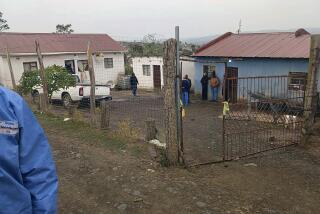Police Occupy Townships to Halt Violence : South Africa: The ethnic fighting threatens the country’s fragile peace process. More than 140 people are dead and hundreds injured.
- Share via
JOHANNESBURG, South Africa — Hundreds of policemen and soldiers moved to restore order Wednesday in three Johannesburg townships racked by two days of ethnic fighting that has left more than 140 people dead and hundreds injured.
The conflict, the largest outbreak of township violence in years, threatened the country’s fragile peace process and undermined the efforts of black leaders to counter claims by right-wing whites that a future black government would collapse in tribal warfare and anarchy.
The fighting--in Tokoza, Katlehong and Vosloorus townships southeast of Johannesburg--pitted Zulus from Mangosuthu Gatsha Buthelezi’s Inkatha movement against Xhosa supporters of Nelson Mandela’s African National Congress. The rivalry between the ANC and Inkatha has taken more than 3,000 lives in the last three years in Natal Province, and last month it spread to townships near Johannesburg.
ANC leaders blame the clashes on Inkatha, which they say has been attempting to improve its negotiating position with the government by recruiting new members and killing off ANC supporters.
Buthelezi denies this. He says that Inkatha is “totally committed to peaceful solutions.” But he said that he resents what he believes are ANC attempts to exclude him and his organization from talks on a new South African constitution.
Buthelezi blames the surge of violence on Mandela’s refusal to meet with Inkatha leaders to iron out their differences. Mandela has met with a wide range of black leaders but fears that a meeting with Buthelezi would anger ANC supporters in Natal who have lost family members and homes in battles with Buthelezi’s fighters.
The first attacks this week came in Tokoza, at a squatter settlement and an overcrowded men’s dormitory complex where laborers are housed. By Wednesday, bands of men armed with rifles, spears and sticks marched through the streets of Tokoza and the nearby townships of Katlehong and Vosloorus. Reporters saw a crowd catch a fleeing man, pour gasoline on him and set him on fire.
Policemen and soldiers conducted a door-to-door search Wednesday, collecting truckloads of homemade weapons as well as rifles and hand grenades. Armored troop carriers took up positions throughout the townships.
“We will remain there until we are satisfied that both groups can stay out of each other’s hair,” Capt. Eugene Opperman, a police spokesman, said.
Community leaders met Wednesday night in a bid to end the conflict. Law and Order Minister Adriaan Vlok urged them to act quickly.
“There can be no winners, only losers and untold misery when opposing parties fight each other as is happening now,” Vlok said. He urged leaders “of the respective factions to use their influence to stop this unnecessary killing and violence.”
The police blamed the fighting near Johannesburg on ethnic rivalries, but ANC spokesmen contended that it was politically motivated.
Although Mandela is a Xhosa, the ANC is a multiethnic organization that counts among its leaders whites as well as Zulus and Xhosas. Inkatha’s 2 million members are predominantly Zulu. ANC leaders in the affected townships said that blacks from all ethnic groups had lived peacefully together until Inkatha supporters from outside began stirring up trouble.
“The Xhosa-Zulu factor is a disguise,” said Chris Dlamini, vice president of the ANC-affiliated Congress of South African Trade Unions. “It is clear that Inkatha is exporting the battle to the Transvaal (province) to fight for its existence in the political arena.”
ANC leaders blamed the police for siding with Inkatha supporters, saying that officers had refused to stop armed gangs of Zulus.
The police denied the allegation.
“We’re taking no sides whatsoever,” Capt. Opperman said. But he added that “the police cannot be everywhere at the same time.”
More to Read
Sign up for Essential California
The most important California stories and recommendations in your inbox every morning.
You may occasionally receive promotional content from the Los Angeles Times.











